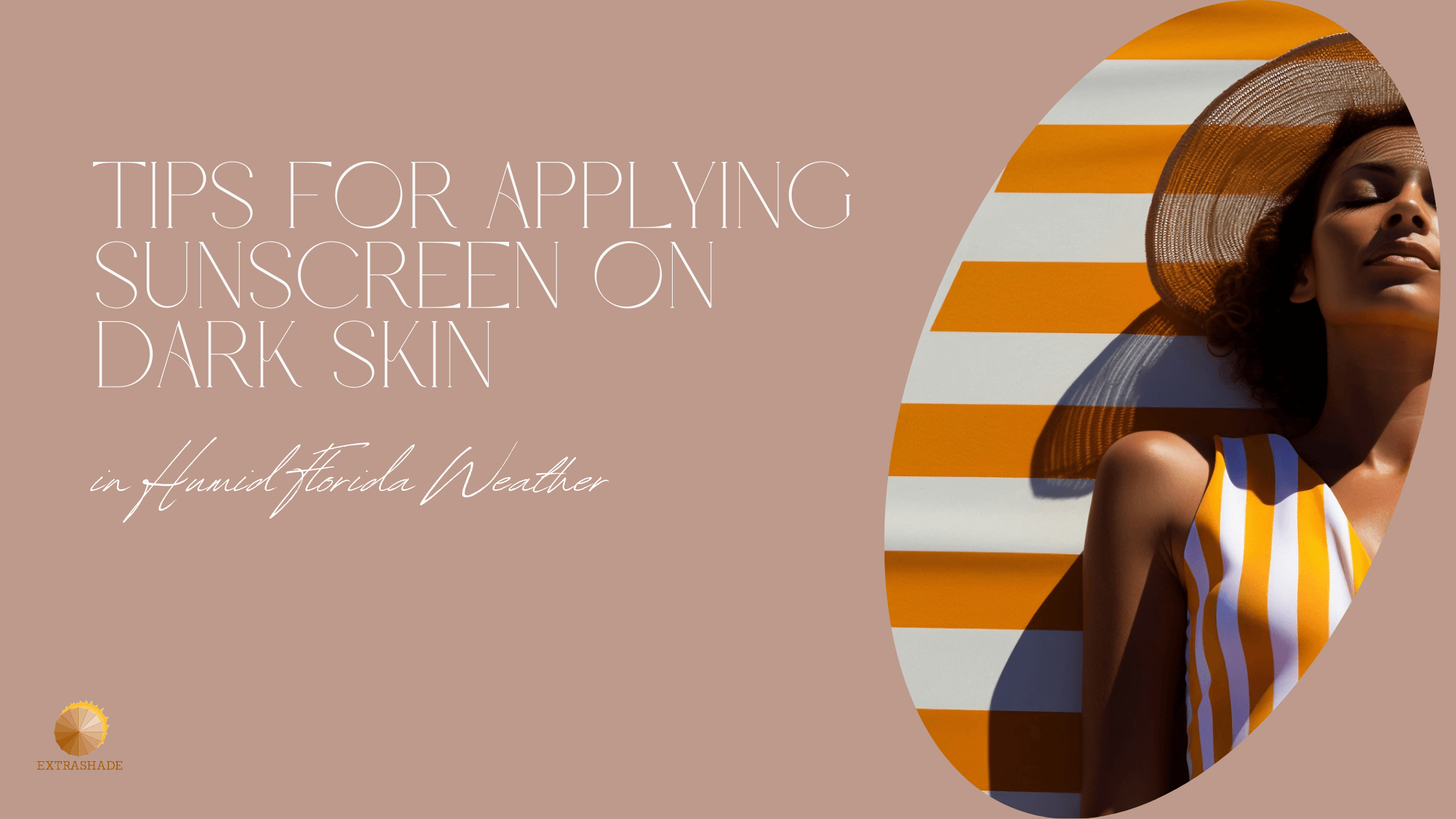The intense Florida sun and high humidity can wreak havoc on dark skin, causing damage like hyperpigmentation and premature aging. Many sunscreens feel heavy or leave an unwanted white cast, making them less appealing for daily use.
You deserve a solution that not only protects your skin but enhances its natural beauty without feeling greasy or uncomfortable. It’s frustrating to find sunscreens that don’t cater to your specific needs, leaving your skin vulnerable to damage despite your best efforts.
With the right tips and techniques, applying sunscreen on dark skin in Florida’s humid weather becomes easy and effective. Choose a sunscreen like EXTRASHADE, designed for deeper skin tones, offering smooth, non-greasy protection while hydrating and enhancing your complexion.
Let’s dive into the best practices for flawless sunscreen application in humid conditions.
Why Sunscreen is Essential for Dark Skin in Florida?
i. Protecting Against Sun Damage
Though dark skin has more melanin, which offers some natural sun protection, it is still vulnerable to damage from UV rays. The humid Florida weather amplifies the intensity of the sun, making it crucial for everyone, including those with deeper skin tones, to wear sunscreen daily. UV exposure can lead to hyperpigmentation, dark spots, and, in severe cases, skin cancer.
iI. The Risk of Hyperpigmentation
Dark skin tends to develop uneven patches of darker pigmentation when exposed to the sun. In humid climates like Florida, this problem can worsen because sweat may wash off sunscreen, leaving areas of the skin unprotected. Applying sunscreen regularly helps prevent discoloration and keeps your complexion even.
Choosing the Right Sunscreen for Dark Skin
1. Look for Broad-Spectrum Protection
In Florida’s intense sun, broad-spectrum sunscreen is a must. It protects against both UVA and UVB rays, the two types responsible for sunburn, skin damage, and aging. EXTRASHADE is formulated specifically for darker skin tones and offers this dual protection without compromising on texture or feel.
2. Choose a Lightweight, Non-Greasy Formula
Heavy, greasy sunscreens can feel uncomfortable in humid weather, especially for dark skin. EXTRASHADE Sunscreen is lightweight, fast-absorbing, and won’t clog pores, making it ideal for the sticky, humid environment of Florida. The non-greasy formula ensures you won’t feel weighed down, even on the hottest days.
3. Look for Hydration Benefits
Humid weather may make you feel like your skin is always hydrated, but it can actually cause the skin to lose moisture. A sunscreen with moisturizing ingredients, like EXTRASHADE, will keep your skin hydrated while protecting it from the sun’s harmful rays.
Tips for Applying Sunscreen on Dark Skin in Humid Conditions
i. Cleanse and Exfoliate First
Before applying sunscreens, cleanse your skin to remove dirt, oil, and sweat. In humid climates, these can build up quickly and block the absorption of your sunscreen. Exfoliating a couple of times a week also ensures a smooth surface for your sunscreens to spread evenly.
II. Apply Generously
For maximum protection, apply sunscreens generously. Many people with dark skin tend to under-apply sunscreen, which reduces its effectiveness. Ensure you cover all exposed areas, including commonly missed spots like the ears, neck, and back of the hands. Aim for about a nickel-sized amount for the face and more for the body.
III. Reapply Every Two Hours
In Florida’s humidity, sweat and moisture can cause sunscreen to wear off faster. Make it a habit to reapply every two hours, especially if you’ve been sweating or swimming. Carry a travel-sized bottle of EXTRASHADE with you to ensure continuous protection throughout the day.
IV. Layer With Other Skincare Products
To avoid feeling weighed down, layer your sunscreens with lightweight moisturizers and serums. Apply sunscreen as the last step in your skincare routine before makeup. This ensures it sits on top of your skin, acting as a barrier against harmful UV rays.
Sunscreen and Makeup: A Winning Combination
1. Use Sunscreen Under Makeup
Many foundations now include SPF, but that may not be enough. For full protection, apply sunscreen like EXTRASHADE under your makeup. Its smooth, lightweight texture makes it easy to layer with foundation and other beauty products.
2. Opt for Sunscreen Setting Sprays
If you’re wearing makeup in Florida’s heat, a sunscreen setting spray can be a game-changer. Look for options that provide added SPF and can be spritzed on top of makeup without disrupting your look. This makes it easy to reapply throughout the day.
Common Sunscreen Mistakes to Avoid
i. Skipping Sunscreen on Cloudy Days
Even when it’s overcast, UV rays penetrate through clouds and cause skin damage. Dark skin is still susceptible, so make sure you apply your sunscreen every day, regardless of the weather.
II. Not Reapplying After Swimming or Sweating
Even if your sunscreen is water-resistant, swimming or sweating can reduce its effectiveness. Always reapply after activities that cause moisture to build up on your skin, especially in Florida’s humid environment.
III. Forgetting to Apply on the Body
While the face often gets the most attention, don’t forget the rest of your body. Shoulders, arms, legs, and feet are equally exposed to UV damage. Applying sunscreen generously to these areas helps protect the overall health of your skin.
Conclusion
Applying sunscreen on dark skin in humid Florida weather doesn’t have to be a challenge. By selecting a broad-spectrum, lightweight formula like EXTRASHADE, and following these tips for proper application and reapplication, you can maintain healthy, protected skin all year round.
Staying consistent with your sunscreen routine helps prevent sun damage, keep your complexion even, and allows your skin to thrive under the Florida sun.

